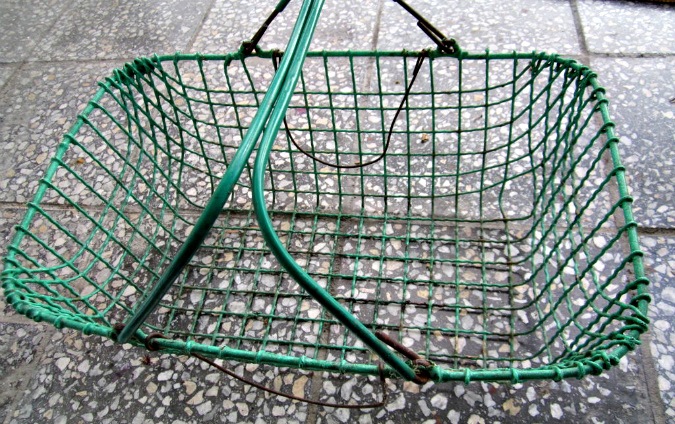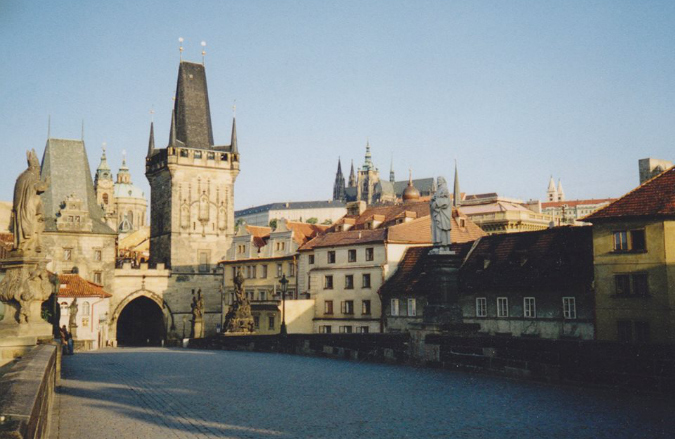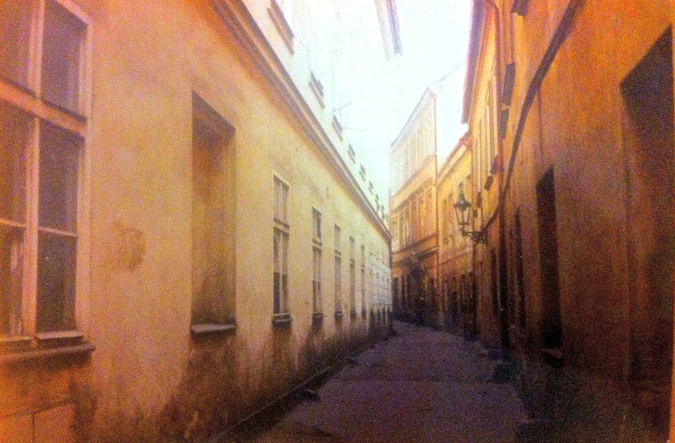The Iron Curtain fell 25 years ago this month and ever since foreigners have been coming to Prague, seeking the life bohemian. While the rents have gone up, the dollar has taken a dive, and visa restrictions have tightened, it’s still a great time to live in Prague (if only because you can now drown your bureaucratic sorrows with a craft beer and a designer burger). Those of us who are commemorating a decade or two in the Czech Republic this year remember when things were a little different, when the struggle was all part of the romance, and when an edam, kidney bean, and corn burrito passed for Mexican food. Some additional challenges from those days:
Old-school message boards
While today’s expatriate is blithely surfing, searching, and Skyping from the comfort of his or her handheld device, a decade ago the Internet cafe prevailed. And in the dark ages of ’90s Prague you relied on message boards—the kind with thumbtacks. “We lived by the ebbs and flows of the Jo’s Bar cork board,” says American Lou Brauer who came to Prague in 1993. “I found my apartment, friends, sex, plane tix, you name it. No phones, no interweb, just people and their horrible handwriting.”
Sad, sad salads
The Prague farmer’s market with its food trucks, fair trade coffee, and mounds of kale was something expats of a decade or two ago could only dream of. The goal in those days? “Buying the least moldy vegetables you could find. Mostly onions and light green peppers,” says British photographer Sarah Lang who lived in Prague from 1993-2000.
Panic in the dairy aisle
Irish writer Gillian Purves who arrived in Prague in 1995 recalls: “You had to buy five eggs in a paper bag and then try to get them home without slipping on the icy pavement.” American Mark Baker, a former journalist and now travel writer and author, based in Prague since 1991 says, “My earliest memories were of buying milk in a plastic bag. The milk would be piled up in the plastic bags in a big plastic crate. Tetra packs seemed like such a step forward.”
Unwritten shopping rules
Among the unwritten rules of the old Czech samoobsluha was that you took a basket upon entering—or else! Says Susan Ondrasek an American acupuncturist who lived in Prague from 1995-2003 and has recently returned: “The store clerks would run after you insisting that you have a basket. I remember seeing a guy with only one package of razor blades in his.”

Retro shopping basket/photo: http:archiv.aukro.cz
Queuing up
American artist Karen Feldman arrived in Prague in the early ’90s. She considers lengthy lines a hallmark of the early expat experience. “I waited in line for hours for wrapping paper one Christmas,” she says. Others recalls lining up for more essential things like bread. “The queues used to run outside of the buildings,” says Lang. You’d go over to find out what it was for and it would be for a new kind of meat or something arbitrary.”
Hands-off shopping
Ian Willoughby came to Prague as an English teacher in 1993 and is now a reporter for Radio Prague. “Shops with everything behind the counter are quite rare now—I used to dread them,” he says. Feldman agrees: “I remember bras being stashed behind the counter in boxes.” Brit Simon L. lived in Prague from 1991-1999: “They would show you shower gel and other stuff and you couldn’t touch it, just go pay, come back with a paper with a stamp on it, and then they gave it to you.”
Astronomical price tags
And speaking of shopping woes, Willoughby says that it was virtually impossible to buy clothes in Prague til the late 1990s, and, he adds, “Flying home was prohibitively expensive for most people. My first salary in 1993 was 7,000 CZK; a return ticket to Ireland cost me 12,000 CZK.”

Charles Bridge 1994. Photo: Sarah Lang
Toilet troubles
Many vintage expats, including Tim Addison, a media consultant from Canada living in Prague for 21 years, mentioned ultra-scratchy toilet paper as a particular inconvenience: “There were only two types of toilet paper: rough and rougher,” he says. (That’s to say nothing of the pull-cord toilets with high-and-dry ledge!) Ondrasek actually mailed some home to her disbelieving family.
No taste of home
These days Mountain Dew and Doritos are available to discerning palates throughout Prague. But one first generation expat recalls leaner times: “There was a melt down in ’94 when the trucks of yummy [Thanksgiving] goodies headed for [Fruits de France]. The embassy wives were in an uproar. No turkey and cranberry sauce! I went to Jama and had pork knuckles and beer.”
Taxi bandits
Sure, unscrupulous taxi drivers remain a problem in Prague, but regulation has made it possible to hire an honest ride. Back in the day they were downright cowboys says American Ross Larsen. “Taxis before regulation charged 300 CZK to go 50 meters.” British photographer Jacqui McSweeney once attempted to start an argument with a driver “only to be silenced by him showing me the gun he kept in his glove compartment.”
Daily bribes
While no one would accuse Czech officials of complete transparency, even in 2014, back then bribes were just a part of expat life. “Even getting dry cleaning done in a reasonable time frame was subject to bribes,” says Lang. Others recall bribing the foreign police or being escorted to ATMs to pay out personal bribes to cops. American filmmaker Tyler Gooden, in Prague since 2002, even met with payola at the post office: “It was for some Andrei Tarkovsky DVDs I ordered from London. Getting them through the system to my apartment was a nightmare—I wonder if it was because he’s Russian?”

Prague street, 1993. Photo: Tim Addison
All analog, all the time
Addison says that in the ’90s telephones were a luxury. “Many were rotary analog things and making long distance calls was difficult and expensive; but there were broken phone booths that would allow you to call long distance for free!” Willoughby went to the post office to call long distance while C. Most, the American founder of the Cultural Compass Institute who came to Prague in 1990, has a more humorous memory: “Everyone had the same Eurotel phone and ringtone and when the phone would ring you would see several people on the street pat themselves down to reach for their phone.”
No reservations (no, really!)
The restaurant revival may just be one of the most exciting changes to come to Prague. But Baker remembers when simply getting a table was impossible. “You’d go into a restaurant in the Old Town, it would be dead empty, yet there would be a ‘Reserved’ sign on every table.”
The great language barrier
According to this info graphic nearly 26 percent of Czechs can carry on a conversation in English—certain to be a vast improvement from the days when it was difficult to get by if you didn’t know the language. Says Most, who has since returned to Prague multiple times, “One can certainly ‘get away’ with not knowing Czech today but as before, the experience is a shadow of one speaking it.”
Social networking – unplugged
Says Addison: “Polite, inane chitchat was rare as almost everyone knew everyone else and were either crazy or trailblazer types with the balls to travel here or a combination of the two.” Lang: “Maybe the best was just winging it socially. Never knowing who was going to be out, but knowing somebody would.” Californian Megan Bedell sums up the era nicely: “We always carried chalk in our pockets to leave notes for friends all around town.”
And, finally, says Feldman: “It was a different city then, now it’s so global it can sometimes feel like anywhere else.”
**
For an infinitely more exhaustive list check out Ex-Pats in Prague in the 90s.












 Reading time: 6 minutes
Reading time: 6 minutes 

 English
(Advanced)
English
(Advanced) German
(Advanced)
German
(Advanced)
























